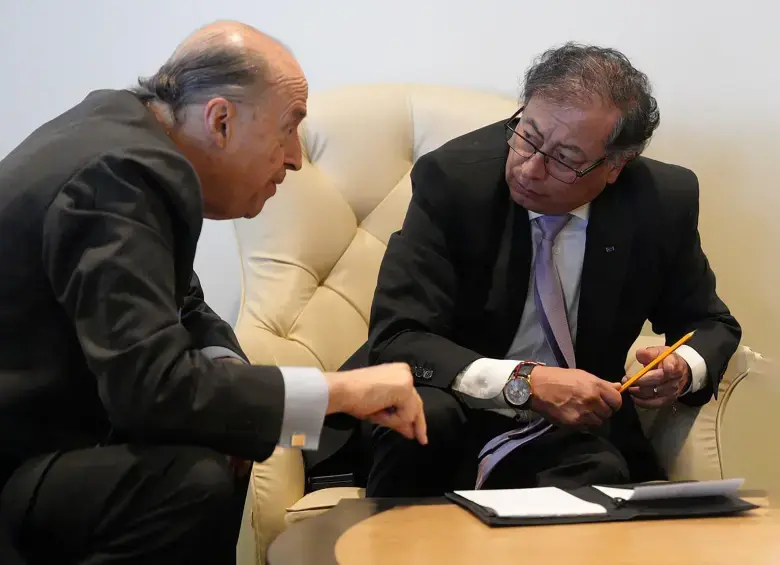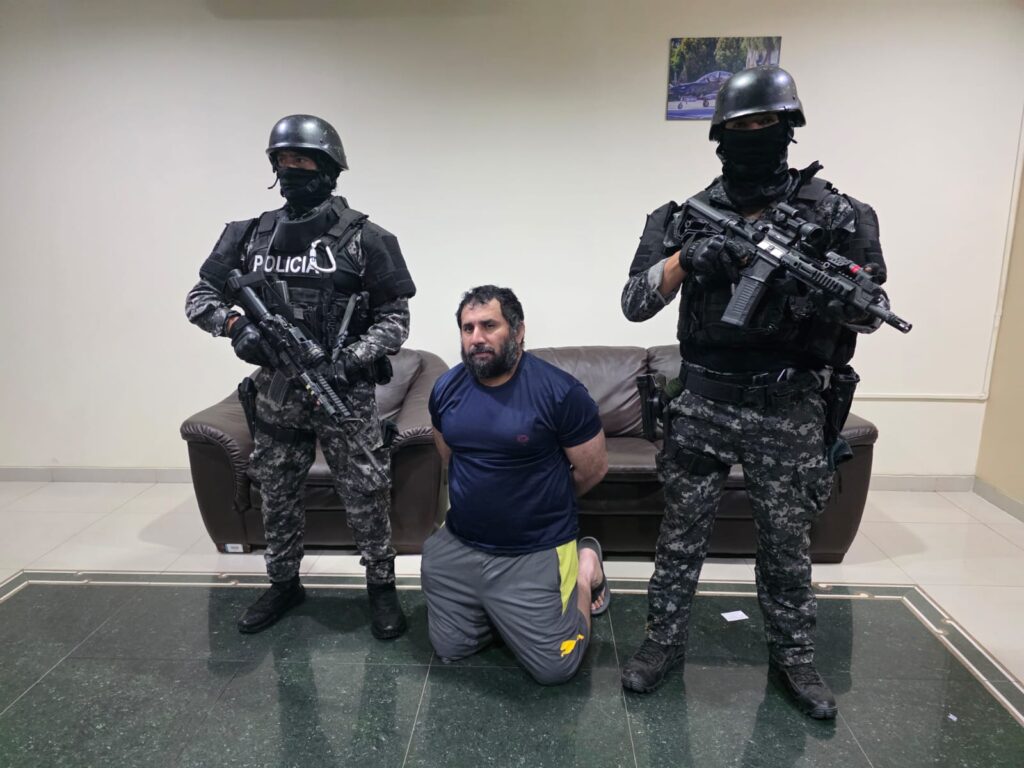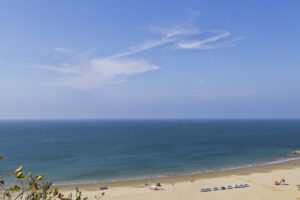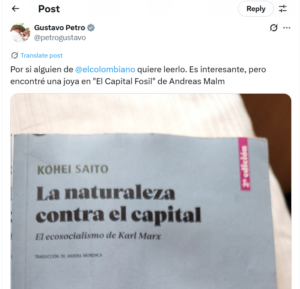Colombian mandate confronts coup rumors at home even as a strange story emerges of a clandestine meet with an Ecuadorian drug lord.

With an election year approaching, Colombians can expect a surplus of bluff, bluster, backstabbing and downright disinformation from their political classes.
But this last week’s twists have left even seasoned commentators reeling: first, sensational recordings published in a Spanish newspaper that purport to reveal a widespread coup plot against President Gustavo Petro involving guerrillas, drug gangs and United States lawmakers.
And then a bizarre accusation from Ecuador that the Colombian president was recently meeting with Fito, a violent criminal drug lord recaptured last week, based on the spurious evidence that Petro went “missing” for two days during a state visit to the neighboring country.
Both stories sound flimsy, but the fact they have captured many column inches of Colombian press suggests the campaign season has well and truly begun. Now, it is only 11 months until election day.
A cooky conspiracy
According to secret recordings revealed in Spanish newspaper El País, the coup plot was planned by 82-year-old Álvaro Leyva, a right-wing politician who Petro took on as foreign minister out of deference to his decades of experience, but sacked in 2024 over dodgy contracts for processing passports.
Leyva was caught on tape in April this year conspiring to oust Petro “within 20 days”, with support of U.S. congressmen, business sectors and a range of Colombian political actors, all of whom strongly deny any involvement.
Ironically, one of Leyva’s stated criticisms of Petro was the president’s faltering Paz Total (Total Peace) negotiations – simultaneous peace talks involving nine criminal groups – in which Leyva himself had participated. Yet the former minister spoke of reeling in armed groups such as the National Liberation Army (ELN) guerrillas and the Clan del Golfo neo-paramilitary group to form a “great national agreement”.
Read more: Is ‘Paz Total’ Actually Total Failure?
Leyva reportedly told associates he had “all the tools” to remove Petro and install Vice President Francia Márquez in his place.
In the recordings Leyva claimed the president was erratic, a drug user, and “incapable of performing his duties.” He claimed he had spoken with Vice President Márquez about her taking over as interim president after ousting Petro.
The veteran politician, who was secretly recorded talking in Spanish to an unknown person in a New York restaurant, also bragged of influence with U.S. Secretary of State Marco Rubio through contacts with Florida congressman Mario Díaz-Balart.
Deluge of denial
Since these details emerged, Colombian politicians of all stripes have distanced themselves from Leyva, with those mentioned in the recordings vigorously denying involvement.
For his part, U.S. lawmaker Díaz-Balart confirmed he frequently “met with people and groups from different parties and with different opinions […] from the current Colombian government,” but he denied ever meeting Leyva, or being privy to the plot.
“I laugh at so many fabrications, nonsense, and hypocrisy. It reminds me of the saying ‘every fool with his own agenda’”, he posted on his X account this week.
Colombian journalist and conservative presidential hopeful Vicky Dávila, suggested by Leyva in the leaks as a “interlocutor” to the plot, publicized her own interview with the former foreign minister where he confesses that “never in any moment …did we discuss this” and that the leaked recordings were of a “private conversation in a restaurant”.
“I do not agree with overthrowing Petro; I have always said this, both publicly and privately,” affirmed Dávila on social media.
Petro himself got wind of the plot rumors in May, when his own secret service informed him of the recordings. This likely explains his own railing of potential coups against him that month – though with scant details – and a visible deterioration of his relationship with his vice president, who also stanchly denies any plot to overthrow her boss.
Mystery in Manta
Even as the dust settled from one political scandal, another whirlwind was whipping up, with Petro being forced to deny sensational accusations that he secretly met one of the most wanted gang leaders in South America — Adolfo Macías Villamar, alias ‘Fito’ – in Ecuador during a May state visit to the neighboring country.

Why Fito, the most-wanted Ecuadorian kingpin who has twice escaped from prison in the last decade, would risk it all to clandestinely meet a foreign leader in a house near the coastal city of Manta is a mystery.
Still, the story Petro was hobnobbing with a narco quickly grew legs in the mainstream media who reported Ecuador’s Interior Minister John Reimberg as saying that Petro “left towards Manta, he was there in the area, he arrived at a luxury house, and he stayed there for two days, if I’m not mistaken. He never went out, not even to eat; he was locked up there.”
Fito was captured by Ecuadorian special forces on June 25, found hidden in the secret bunker of a luxury house close to Manta on the same day that the story broke of an alleged Petro connection. The timing fed online conspiracies of collusion between Colombian authorities and Ecuadorian gangs such as Los Choneros, who are believed to have close links to Colombian cocaine cartels, as per investigative think tank Insight Crime.
Twist in the tale
With the Fito accusations, Petro is possibly the victim of Ecuadorian infighting related to the gang boss’ capture. While initially presenting the arrest as diligent police work, evidence is now emerging that the gang boss may have handed himself in after negotiations with the Ecuadorian authorities.
Ecuador’s Interior Minister Reimberg initially fiercely denied any such deal but later admitted to a video call between Fito and the country’s authorities in early June, an embarrassing detail for the Ministry of Interior, which seemed keen to keep the “police raid” success story rolling.
Was Petro caught in the crossfire, or is there another twist in the ordeal? This week the Colombian Foreign Ministry also confirmed that it had received communication, reportedly from Fito, in early June. While its authenticity has not been confirmed, the message allegedly requested Colombia acting “as a guarantor of his eventual surrender, in order to avoid his extradition to the United States”.
The ministry is said to have ignored the request, as it “does not act as a guarantor for drug traffickers, nor does it have any jurisdiction to mediate in these types of situations”, adding that the extradition of Adolfo Macías Villamar to the United States is a “sovereign and internal process” of Ecuador, and has nothing to do with Colombia.

Meanwhile Petro confirmed that, yes, was in Manta in May for two days after the state visit, holed up in a “a small, high house, overlooking the sea, which is beautiful there,” he tweeted, adding that he was writing a book “on the relationship between capital accumulation and the climate crisis”.
His office has forcefully denied he ever met with Fito. In fact, Petro claims he has never heard of the crime boss, and termed the meeting story as an “otra Leyvada” – another Leyva-type situation – cleverly tying the Ecuador accusations to his own ex-minister’s coup chatter.
Just a coincidence
In Colombia, at least the president has called for an investigation into the Leyva recordings, and the Attorney General has promised to assist, though legal experts doubt that any charges could be realistically brought against Leyva.
Criminal lawyer Juan Felipe Criollo told Colombian newspaper El Tiempo this week that Leyva’s statements “do not constitute an obvious crime that is classified within the criminal legal system. Statements are made that may be uncomfortable, but the truth is that they do not amount to the commission of punishable conduct”.
What remains of the alleged plot are the musings of an embittered former ally of Petro, claims that, so far, exist mostly in Leyva’s own imagination; a regrettable coda for a once-respected lawmaker.

Petro’s sojourn in Manta in May was likely a time out for a busy president, rather than a conspiracy with a narco boss. The region holds Ecuador’s most popular coastal resorts, such as Santa Marianita where Petro reportedly stayed, and it’s not out of character for the president to go dark for a few days, or to be scribbling about the “ecosocialism of Karl Marx”.
Any coincidence with Fito – who holed up in a bunker on the other side of Manta, according to El Comercio – is probably just that: a coincidence.
For now it seems that the Ecuadorian authorities are dragging Petro into the confusion surrounding Fito’s capture- or surrender – and future plans to extradite the gang boss to the U.S.
Perhaps unexpectedly, both sagas have potential to heal Colombia’s political divide. In light of the coup threat, politicians have called for the strengthening of democratic systems. And Ecuador’s clumsy accusations could righteously unite parties of all stripes.





